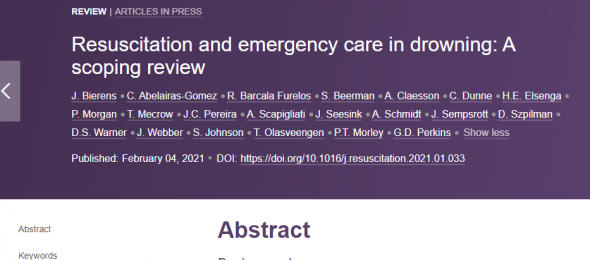J. Bierens J, Abelairas-Gomez C, Barcala-Furelos R, Beerman S, Claesson A, Dunne C, Elsenga HS, Morgan P, Mecrow T, Pereira JC, Scapigliati A, Seesink J, Schmidt A, Sempsrott J, Szpilman D, D.S. Warner DS, Webber J, Johnson S, Olasveengen T, Morley PT, Perkins GD. Resuscitation and emergency care in drowning: A scoping review. Resuscitation. February 04, 2021. DOI: https://doi.org/10.1016/j.resuscitation.2021.01.033
ABSTRACT
Background: The ILCOR Basic Life Support Task Force and the international drowning research community considered it timely to undertake a scoping review of the literature to
identify evidence relating to the initial resuscitation, hospital-based interventions and criteria for safe discharge related to drowning.
Methods: Medline, PreMedline, Embase, Cochrane Reviews and Cochrane CENTRAL were searched from 2000 to June 2020 to identify relevant literature. Titles and abstracts and if
necessary full text were reviewed in duplicate. Studies were eligible for inclusion if they reported on the population (adults and children who are submerged in water), interventions
(resuscitation in water / boats, airway management, oxygen administration, AED use, bystander CPR, ventilation strategies, ECMO, protocols for hospital discharge (I),
comparator (standard care) and outcomes (O) survival, survival with a favourable neurological outcome, CPR quality, physiological end-points).
Results: The database search yielded 3242 references (Medline 1104, Pre-Medline 202, Embase 1722, Cochrane reviews 12, Cochrane CENTRAL 202). After removal of duplicates 2377 papers were left for screening titles and abstracts. In total 65 unique papers were included. The evidence identified was from predominantly high-income countries and lacked consistency in the populations, interventions and outcomes reported. Clinical studies were exclusively observational in nature.
Conclusion: This scoping review found that there is very limited evidence from observational studies to inform evidence based clinical practice guidelines for drowning. The review
highlights an urgent need for high quality research in drowning.

















